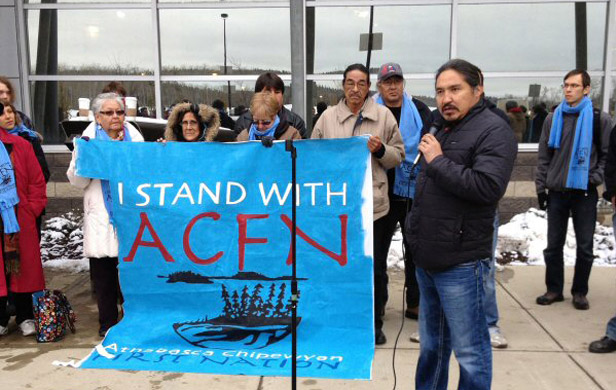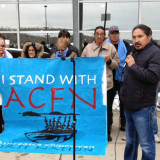
Shell Canada’s Jackpine oilsands mine expansion plan has received the go-ahead from Ottawa, despite the environment minister’s view that it’s “likely to cause significant adverse environmental effects.”
In a statement late Friday, environment Minister Leona Aglukkaq concluded that the effects from the 100,000-barrel-per-day expansion are “justified in the circumstances.”
The nearby Athabasca Chipewyan First Nation has said the project will violate several federal laws covering fisheries and species at risk, as well as treaty rights.
They said they had received so little information on how Shell plans to live up to conditions imposed on it by a federal-provincial panel that they asked Ottawa for a 90-day delay on the decision — originally expected Nov. 6 — to work some of those issues through.
They were granted a 35-day delay, but Friday’s decision didn’t even wait until that period was up.
Allan Adam, chief of the Athabasca Chipewyan First Nation, was outraged that the federal decision came as the government was still supposed to be in talks with the band about how the project’s effects were to be mitigated, declaring:
[quote]They just kept us in the loop and strung us along and played games with us. To them it’s all a game.[/quote]
Although all 88 conditions the review panel placed on the project are now legally binding, Adam said neither the government nor the company has explained how those conditions will be met.
Adam said the government’s move to go ahead despite the serious environmental consequences of the project leave the band little choice.
“This government has to realize we’ll be holding them accountable,” he said. “We’ll be looking at legal action and we’ll pursue this through legal action.”
Greenpeace Canada issued a statement accusing the Harper government of putting the short term interests of oil companies ahead of environmental protection and First Nations treaty rights.
“Canada would be much better off diversifying its economy, investing in renewables, green jobs and projects that get us out of this madness not deeper into it,” the statement said.
[quote]How many more extreme weather events will it take till our Prime Minister realizes this is one problem he can’t mine his way out of?[/quote]
The Jackpine expansion would allow Shell to increase its bitumen output by 50 per cent to 300,000 barrels a day.
“We’re reviewing the recommendations and proposed conditions attached to the approval,” said Shell spokesman David Williams.
Williams added Shell must consult with the minority partners in the project — Chevron and Marathon — before making a formal decision to proceed.
A review panel concluded last July that the project was in the public interest but warned that it would result in severe and irreversible damage so great that new protected areas should be created to compensate.
The review concluded that the project would mean the permanent loss of thousands of hectares of wetlands, which would harm migratory birds, caribou and other wildlife and wipe out traditional plants used for generations. It also said Shell’s plans for mitigation are unproven and warned that some impacts would probably approach levels that the environment couldn’t support.
Shell has said Alberta’s new management plan for the oilsands area will provide more concrete data to assess and mitigate environmental impacts. The company has purchased about 730 hectares of former cattle pasture in northwestern Alberta to help compensate for the 8,500 hectares of wetland that would be forever lost.


Pastureland for wetlands? Great environmental trade off that will be – not quite the same ecological function is it?
I will boycott Shell, in that case. Moving to electric asap.